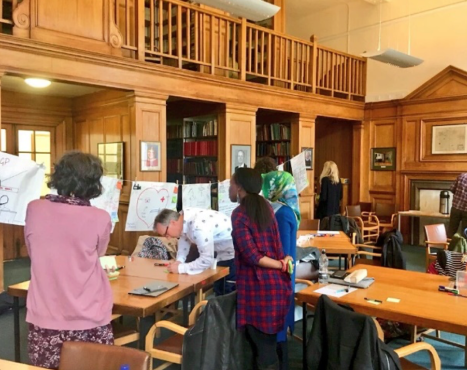Graduate students doing EM/CA work in places where there aren’t many others of like mind, can sometimes feel a little isolated. That’s where an association like the EM/CA doctoral network comes into its own. Paula Greenlees reports on the most recent event, held in the elegant rooms of Edinburgh University.

Paula Greenlees, Edinburgh University
On a beautiful spring morning, a group of researchers from across the country and beyond gathered in Edinburgh, the city where Erving Goffman published his first book ‘The Presentation of Self in Everyday Life’.
In the atmospheric wood panelled Old Library in the Old Infirmary building, the two day event began with a welcome from host Eric Laurier and an introduction to a create-your-own-poster session. Although the quality of poster subsequently produced varied (it was noted that the majority of students from one unnamed university came prepared with their own high quality felt tipped pens) the range of research on display promised an interesting couple of days ahead. The hand drawn masterpieces were pinned up around the room for a mini poster session and provided a really effective way of seeking out those with similar research interests and finding out what other EMCA PhD research work is currently underway. As we had a chance to leave notes on the posters, we received some useful peer and expert feedback too!

A good way to find out who’s doing what
The event continued with a range of data sessions covering varied and interesting subjects. Nathalie Flint presented data on remedying conflict in family interactions, meanwhile Jack Joyce brought data on enticing in conflict. After a delicious lunch provided by Edinburgh University we heard from Mike Stevenson on negotiating consensus in decision making and Mirjam Eisworth on minimal responses in face to face narratives. The final sessions of the day were given by Antti Kamunen on embodied practices in multitasking and Ethan Shapiro with a video analysis of clinical handovers between paramedics and emergency department staff.
Many thanks to those students (on both day 1 and day 2) who brought data, as the sessions provided a great opportunity to analyse data in a large group setting. Although here at Edinburgh we are lucky to have fortnightly SEDIT sessions, meaning regular participations in data sessions of this kind, the different slants on EMCA work presented were personally very useful. The variety of academic institutions and disciplines involved make these EMCA doctoral network data sessions a value-added experience for any PhD researcher in the area.

Eric Laurier announces Liz Stokoe’s plenary, in best long-distance style
At the close of day one, Liz Stokoe’s fascinating plenary, outlining her career to date, left us on a high and ready for a fun group dinner at local restaurant Spoon. I’ll definitely take away the range of useful tips for success as a PhD researcher, my favourite tip being the importance of building collections and attending data sessions to avoid over-estimating the uniqueness of your data.
Showcasing students’ research
On day two we were fortunate to view some superb presentations showcasing current research. Antti Kamunen gave a talk entitled Bodily and Spatial orientation in multiple-tasks surroundings, Mirjam Eiswirth presented her work Using CA-based coding to improve understanding of variation in listener responsesand Louise White gave her talk A discursive analysis of suspected criminals’ accounts across interactional settings. There followed a new addition to the event in the form of two attendees, Antti Kamunen and Eve Mullins, presenting their papers and receiving both peer and expert opponent responses. As a novice researcher it was useful to get a feel for how this process works while in a friendly and supportive environment.

Louise White (Loughborough) on how people do being innocent
After lunch and a quick walk around the historic centre of Edinburgh, we were treated to the final data sessions of the event. Shawn Bodden brought data on playing with pigeons, Nimet Cooper’s session studied student-initiated humour in English as a foreign language classes, Reihaneh Afshari Saleh presented data on emotional displays in Persian natural interactions and Karolyn Cherono Ng’eno’s data examined audience identity in the EU referendum.
EM/CA Confidential
To round things off a Q&A session with questions coming from an anonymous ‘Ask the experts the questions you are too afraid to ask publicly’ Dropbox gave us all a chance to voice those awkward questions we felt we should already know the answers to! My favourite question, as it triggered me to investigate the subject myself, was How do you do Membership Categorisation Analysis? Good question – I’ll let you know the answer when I find out!
With grateful thanks to Eve Mullins, who took the central role in organising the event this year.
If you are a PhD or early career researcher in EMCA then I would wholeheartedly recommend that you come along and join us for this biannual event. You can join the EMCA doctoral network facebook page for updates or see our Facebook page.
